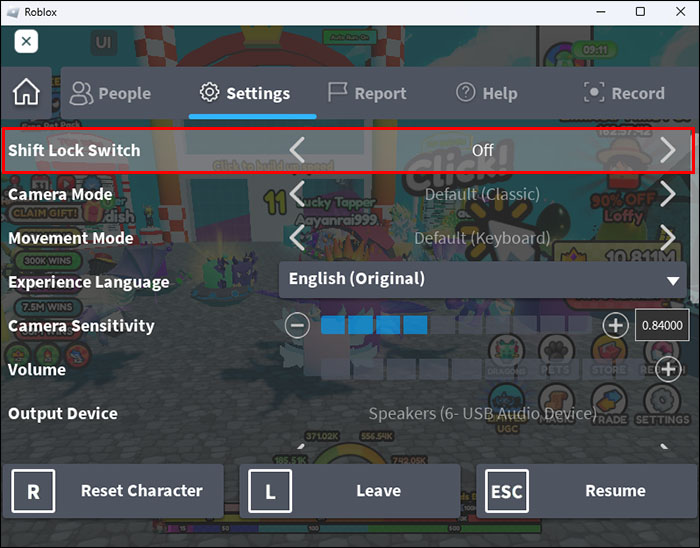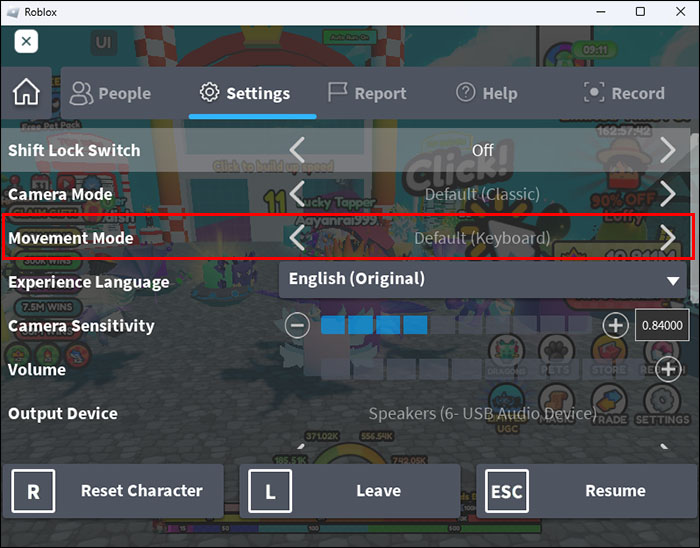They may have different lifestyles and ages, but players from around the world all have fun with games on Roblox. The platform has many titles, including shooters, social games, and casual titles. But with so many genres and different controls for every game, it can be confusing. And playing Roblox games when controls don’t work as you want can get annoying. Read on to discover more about changing and disabling controls in Roblox for the best experience.
Disabling Controls on Roblox
To disable controls, you have to access the player module that’s in the player scripts. It has a Get Controls function that returns the Controls class. This option has the enable/disable methods. Here is an example:
local LocalPlayer = game:GetService(“Players”).LocalPlayer
local Controls = require(LocalPlayer.PlayerScripts.PlayerModule):GetControls()
Controls:Disable()
To enable it, you need to write:
Controls:Enable()
This way, you can successfully enable and disable controls.
Change Roblox Controls
To customize basic controls, you need Roblox Studio. These changes can only be made by game admins. The controls cannot be changed in-game. Most games have WASD key controls. To modify these, you would first need to be an administrator. You can then use the instructions below.
To customize the game controls:
- Navigate to Roblox Player and the Run a Test Version.
- From “Explorer,” you need to choose “StarterPlayer.”
- Go to “Properties” then scroll to “Controls>DevComputerMovementMode,” Change the controls as you deem fit.
Control Options on Roblox
ClickToMove: Allows the player to move in the world by right-clicking their target location.
KeyboardMouse: Requires the use of Space to Jump and WASD to move.
Scriptable: Allows control scheme scripting.
User choice: Makes it possible for players to pick their control scheme accessible in the settings menu on the game.
Dynamic Thumbstick: When a player presses down initially, Thumbstick appears.
Thumbstick: Keeps the control in a position like the dynamic counterpart. Appears in the screen’s lower left section of the screen.
The game controls can be changed on the desktop by altering the value of Controls>DevComputerMovementMode under the custom scripts.
In the case of mobile gadgets, the game controls can be changed by altering the value of Controls>DevTouchMovementMode.
Using Shift Lock on Roblox
This is a suitable method when you prefer playing using the keyboard only and without rotating the camera’s perspective all the time through the mouse. Shift lock is a feature that locks the camera perspective with the player’s movement in a third-person view.
Activating the shift lock or the mouse lock is achieved by pressing the “Shift” key. Some of the Roblox games have a mouse lock feature that’s built-in. To shift lock:
- Open the Roblox player and initiate any game.

- Navigate to “Settings” in-game.

- Enable the “Shift Lock Switch.”

- Press the “Esc” button and then choose “Shift.” This enables the mouse lock feature.
Changing Keyboard Controls
For PC gamers, there are various input devices you may opt to use. You can utilize the mouse or a keyboard to provide countless possibilities to play and match. You can create an easy-to-use setup for seamless gameplay. This isn’t possible with mobile gadgets.
Default Roblox Controls
Before changing the keyboard controls, let’s look at the default Roblox controls. These controls are used in a wide range of games without having to disable or make any changes. Getting on board with this helps you start a new game.
Basic Controls
Anyone who’s ever participated in a computer game knows WASD controls, as they are common in most games. For beginners, arrow keys may be easier to use when controlling movements. However, WASD keys – the letters W, A, S, and D – sit amid other keys. This allows easy access to other controls without moving the hands or fingers. They are controlled using the left hand, which leaves the right hand free to handle the camera controls.
- W moves forward

- S moves backward

- A moves to the left

- D moves to the right

If you aren’t familiar with the controls or you prefer right-handed movements within the game without camera controls, the arrow keys might be easier.
- Up Arrow: move forward.

- Down Arrow: move backward

- Left arrow: move left

- Right arrow: move right

The spacebar is usually the default button for jumping. It can be accessed with the left thumb, making the placement convenient.
Mouse and Camera Sensitivity
This determines the mouse’s responsiveness to the camera movement. Higher mouse sensitivity translates to more camera movement, even when the mouse motions are minimal.
There are two elements (GUI) that make it possible to tweak the setting. The more straightforward option is a slider that has 10 boxes. If you choose between no boxes, the sensitivity will be zero. You can set it to one by turning all the boxes blue.
The input box can set any value from 0-10 for advanced editing. Use non-integer values to specify the sensitivity you need. If gaming mice have dpi settings, set it higher for more sensitivity.
Changing the Keyboard Controls
This is relatively simple. However, it’s important to note that not all the games on Roblox allow key binding changes. You’ll have to play with the default keys or third-party apps to swap keys. If there isn’t a suitable solution, consider getting a controller.
If the Roblox game allows control changes, follow the steps below:
- Open Roblox by double-clicking its icon on the desktop.

- Sign into the account. Don’t continue as a guest user because you might lose the changes you make to the controls.

- Select a game and open up the main screen.

- On the main screen, hit the “ESC” key to pause the game. A menu pops up. Find “Settings” in the menu and open it.

- In the “Settings” menu, find the “Controls.” You’ll see keyboard keys with their binding.

- Double-click the binding that you want to change and then press the button it will be replaced with. This disables the previous control.
Why Changing Controls Is Necessary
Roblox has a wide range of genres; sometimes disabling and replacing some controls with others gives you the desired scheme. While the basic controls are usable in most games, adjusting them is necessary when you want to handle complex actions in the game, like driving and shooting.
Some Roblox games have settings to assist with complex actions. However, when a player wants to make a change, they can choose a binding that works and matches their needs. Changing controls allows players to be free to pick their control scheme preferences.
Elevate the Roblox Gaming Experience by Tweaking Controls
The ability to change Roblox controls is a great advantage to gamers globally. With the right steps, some controls can be disabled and replaced with the ones that make the most physical sense for the players. Customize controls to elevate gameplay to the highest levels.
Have you ever attempted to tweak Roblox controls? How was the experience? Let us know in the comments section below.
Disclaimer: Some pages on this site may include an affiliate link. This does not effect our editorial in any way.
























